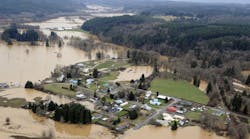Washed Up
Many parts of the U.S. have experienced flooding this spring, a sharp contrast to last summer and fall, when most of the country was in various stages of drought—which itself cannot yet be ruled out of the realm of possibility for the coming months.
Flooding, especially in the 772 U.S. communities that have combined sewers, is an expensive and disastrous byproduct of spring rains. April was an especially wet month this year, and many parts of the Midwest and Plains states flooded as rivers crested and sewers overflowed, causing a great deal of damage to homes, cars and properties, and even death, in a few sad cases.
It is during times like these that the average citizen realizes the importance of storm water management and erosion control, and the need to fund green and grey-green infrastructure to control flooding and sewer overflows—two problems that most people rarely think about until it is too late.
Public-private partnerships are one way to pay for updates to old infrastructure and new construction that does not place the burden of expense too heavily on any one entity. Another less popular way is a storm water fee, in which property owners are rewarded for using green practices like pervious pavement or taxed for not doing so, creating a financial incentive for property owners to retrofit their assets with BMPs.
Some cities in states like Maryland and Florida are considering charging a storm water tax that all residents would pay, even if they live in an apartment or own properties that do not heavily impact local systems. Many are against the tax on the basis that it is unfair to apartment dwellers or minimum wage earners, but others argue that it is everyone’s responsibility to keep waterways clean and ensure that a few days of heavy rain do not put some unfortunate citizens out of a home.
Despite all of the uproar about storm water fees and municipal budget cuts in the nation’s news recently, perhaps reports of the intense floods this spring and the losses suffered will get people thinking about how to pay for ways to prevent this kind of destruction.
Download: Here

